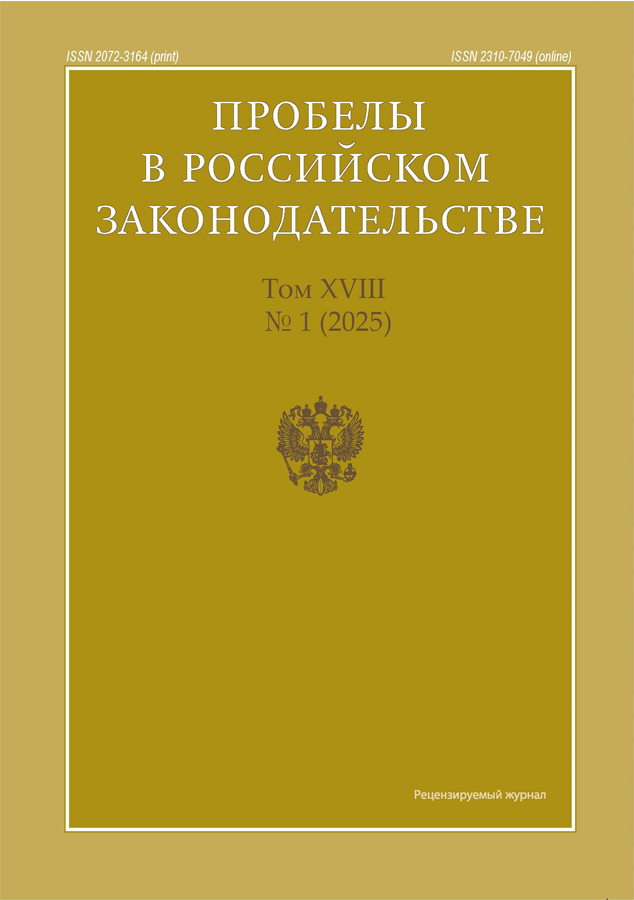Problems of identifying criminal violence of persons deprived of liberty
- Autores: Kravets I.P.1, Zhuk I.O.1
-
Afiliações:
- Volga State University of Water Transport
- Edição: Volume 18, Nº 1 (2025)
- Páginas: 118-130
- Seção: Criminal Law Sciences
- URL: https://bakhtiniada.ru/2072-3164/article/view/288817
- EDN: https://elibrary.ru/OMPJYK
- ID: 288817
Citar
Resumo
The article examines issues of criminal violence in places of deprivation of liberty, which takes the legal form of a penitentiary crime. Being a type of the general concept of crime, a penitentiary crime has all its features: social danger, criminal illegality, guilt and punishability. However, these features have a certain specificity, conditioned by the nature of the illegal behavior of persons deprived of liberty. The objective of the presented research is that any intentional crimes committed by convicts in places of deprivation of liberty contain a destructive element for these places, which increases the social danger of such acts. The natural possibility of the existence of penitentiary crime (despite the efforts of the administration) in correctional institutions is a consequence of the increased danger of malicious offenders from among those deprived of liberty and an inevitable socio-psychological phenomenon — a criminal subculture. Thus, individual penitentiary crimes also cause harm to the interests of the individual, society and the state: for example, disruption of the activities of institutions that ensure isolation from society (Article 321 of the Criminal Code of the Russian Federation); murder of a person or his relatives in connection with the implementation of official activities by this person or the fulfillment of public duty (Part 2 of Article 105 of the Criminal Code of the Russian Federation). These crimes cause damage to all means of correctional influence on convicts. They hinder the strengthening of the regime for the detention of convicts, their involvement in socially useful work, and the implementation of educational work with them. Based on the study, the authors conclude that the study of penitentiary parameters of violent crimes, which in the structure of crime in the execution of all types of criminal punishments make up on average one third, as well as the study of the personality characteristics of violent penitentiary offenders can provide invaluable assistance both in the work on the resocialization of violent criminals and in the prevention of violent criminal behavior of convicts and prisoners in correctional institutions and pretrial detention centers.
Texto integral
##article.viewOnOriginalSite##Sobre autores
Ivan Kravets
Volga State University of Water Transport
Autor responsável pela correspondência
Email: kipkn@mail.ru
Código SPIN: 7211-3157
Cand. Sci. (Law), Head of the Department of State Law Disciplines, Institute of Economics, Management and Law, Department of State Law Disciplines
Rússia, Nizhniy NovgorodIgor Zhuk
Volga State University of Water Transport
Email: kipkn@mail.ru
Código SPIN: 5606-4946
Cand. Sci. (Law), Assoc. Prof., Associate Professor of the Department of Criminal Law Disciplines, Institute of Economics, Management and Law, Department of State Law Disciplines
Rússia, Nizhniy NovgorodBibliografia
- Boyko I. B., Uvarov I. A. Prevention of suicide among convicts as a factor in preventing offenses in places of deprivation of liberty // Problems of the activities of internal affairs bodies in the context of transition to a market economy. Rostov n / D, 1995. P. 52.
- Brockhaus F. A., Efron I. A. Encyclopedic Dictionary: In 86 volumes. Vol. 40. St. Petersburg, 1890. P. 638.
- Baron, Robert A. Aggression / Robert Baron, Debiora Richardson; [translated from English by S. Melenevskaya, D. Viktorova, S. Shpak]. — 2nd ed. — Moscow [and others]: Piter, 2014. P. 23.
- Guseinov A. A. The concept of violence and non-violence // Questions of Philosophy. 1994. No. 6. P. 36.
- Dmitriev A. V., Zalysin I. Y. Violence: socio-political analysis. Moscow, 2000.
- Karpets I. I. Crime: illusions and reality. Moscow, 1989. P. 285, 286.
- Kostyuk M. F. Criminal-legal and criminological problems of combating crime in correctional institutions. Moscow, 2000. P. 5.
- Lakeev A. A. The concept of subjects of criminal law // Punitive policy of Russia at the turn of the century: Materials of the All-Russian interdepartmental scientific-practical conf. March 29, 2001, Vladimir / VYU Ministry of Justice of Russia. Vladimir, 2002. P. 49.
- Lester D., Danto B. L. Op. cit. P. 37–48.
- Malchuk O. I., Nuzhdin A. A. Operational-search crime prevention in correctional institutions: theoretical aspect. Penal system: law, economics, management. 2018. No. 1. P. 29–31.
- Nuzhdin A. A. FKU DPO Kirovsky IPKR FSIN of Russia, FGBOU VO VyatSU, 2019.
- Oleynik A. N. Prison subculture in Russia: from everyday life to state power. Moscow, 2001. S. 162.
- Polischuk N. I. Legal facts in correctional labor law: Abstract of Cand. Sci. (Law) thesis. Ryazan, 1995. S. 20.
- Ponomareva S. Imaginary and real tears // Molva. 2003. March 13.
- Starkov O. V., Milyukov S. F. Punishment: criminal-legal and criminological analysis. St. Petersburg, 2001. S. 268, 275–276.
- Repetskaya A. L., Suturin M. A. Russian penitentiary crime: dynamics of the current state and structure. — 2019. Irkutsk State University, Irkutsk, Russia. P. 83–84.
- Khokhryakov G. F. Paradoxes of prison (Problems, discussions, proposals). M., 1991. P. 18.
- Sharapov R. D. Physical violence in criminal law. St. Petersburg, 2001. P. 290.
Arquivos suplementares








